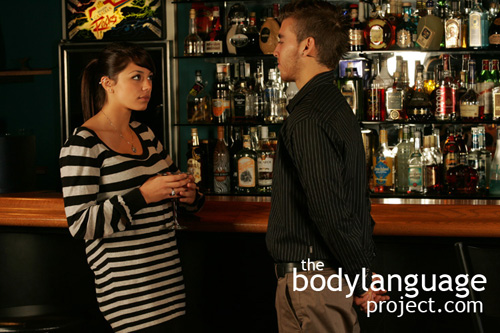When you first arrive remove your outerwear and hang it up if possible. Try to make it seem like you belong and already fit in. When you are waiting, take notes. Have a look at the secretary and her dress and look around at others. How are they dressed? Are they casual or dressed formally. This can tell you a lot about the office’s standards of conduct. Is the office busy or quiet? Get into this framework and picture yourself there. If there is any information or company accolades on the wall, read them, and mentally make notes as you can potentially use them in your interview. If possible, remain standing in the waiting room, so as not to go unnoticed. Don’t fidget, instead remain relaxed with authoritarian postures such as the military man with hand in hand behind the back trying not to appear closed.
Tag Archive for Military Man
The Military Man
by Chris Site Author • March 5, 2013 • 2 Comments

The ‘military’ or ‘regal’ stance occurs when the hands are clasped behind the back. This high confidence posture was made popular by royalty.
The “military man” sometimes called the “regal stance” when carried by royalty is a posture that occurs by placing the hands, palm in palm behind the back openly exposing the chest, usually accompanied by chin up and out, and head held back. The hand gripping the wrist or upper arm in behind the back sends an emotional message of frustration and an attempt at self control, but forms no part of what is said by the military man. Usually the feet of the military man are splayed outward so as to take up more space and dominance, which is opposite to tibial torsion when the toes point inward to signal submission. When the feet are turned outward, they indicate that a person is upset, being threatened or is threatening others. When it comes to the feet, the wider the feet are spread the more confrontation is displayed since when people ready to fight, they wish to carry a more balanced stance to avoid getting knocked over. In other words, legs will never be crossed during confrontation for the simple fact that it becomes much more difficult to escape an attack or fight a battle. Subconsciously our brains know this well, so won’t permit it. Likewise, as people become less agreeable their feet will become more spaced out. Therefore, as a way to reduce tension during conflict, adopt a less splayed posture, or even keep the legs crossed showing a lack of desire to compete.
The military man posture is reserved almost exclusively for dominant individuals, leaders, and those of high status and others who expect little or no challenge whatsoever of their authority. It is popular among lawyers, doctors, university professors, policemen or high ranking military personnel such as sergeants. Those in the military can be seen competing within rank by ever increasing leg splaying. It can also be found in (over) confident store clerks, oddly enough, who parade their booths during slow periods presumably seeking someone to commerce with. Power is nearly the exclusive meaning delivered by the posture as it exposes the full front of the body to possible attack; even invites it with an extended pointed chin. The message is also one that says “Don’t come near me, I’m important and I shouldn’t be touched!” The Queen of England and Prince Philip are noted with this body language due to their high rank and importance.
Boxers learn early on to tuck their chins down to protect it, as it is the easiest way to produce a knock out, opposite to the military man. The chin blow is so devastating in combat because when the jaw is hit hard enough with the right technique, it slams directly into the temporal mandibular nerve producing shock. Not to mention the fact that hard punches sloshes the brain violently around inside the skull cavity which can lead to internal bleeding and swelling. The wiring-our nervous system, is very complicated and also interconnected so a blow to one nerve can send shockwaves throughout the body. This nerve in particular, while vulnerable, also controls the lips, sinuses and digestion among others. Hitting it hard and suddenly is effectively like putting the body into sensory overload causing it to suddenly shut down. In fact, successful boxers want what is called “good chin” or the ability to repeatedly endure blows to the head and chin without passing out. The military man, on the other hand, is one who dares someone to attack their chins by making it an overt target. He says, “Go ahead take a swipe, see what it gets you in return.”
Other times, the military man posture is intended to show a readiness to be open an inviting, although it fails in this regard. We’ve all avoided the eerily empty mall shop whose underpaid employee or distraught owner paces to and fro with his hands to his back. One has to wonder if the empty shop is the cause or effect. Does the body language repel customers or does the body language come from being repelled by customers? I suspect the latter, but this represents my body language bias. Naturally, the clerks would be served well to drop the posture altogether and instead offer something more welcoming.
Police use the military-man posture to put their confidence on display. They know their uniform, badge, and the law they serve, protects them from challenges. School principals and teachers who want to set a strong first impression can also be seen touring their territory with their arms to their backs. My high school principle, in retrospect was mild mannered and quiet, he used his posture to show others he meant business. The next principle, much younger and green, faired far worse in maintaining order. He used his mouth far too often to try to set his tone which merely invited attacks. Evolutionarily speaking the military man is a strutting posture and so it can preemptively avoid potentially harmful physical show-downs between rival men. Other possible root origins stem from its concealment properties. In other words, a spear, knife or other makeshift sharp object might be cocked at the ready to be sprung on unsuspecting challengers – you’d never know, so why risk it! If you had no other choice, would you physically jump a confident looking authority figure or the man hunched over who avoids eye contact? In other words, sometimes the military man posture makes great sense.

